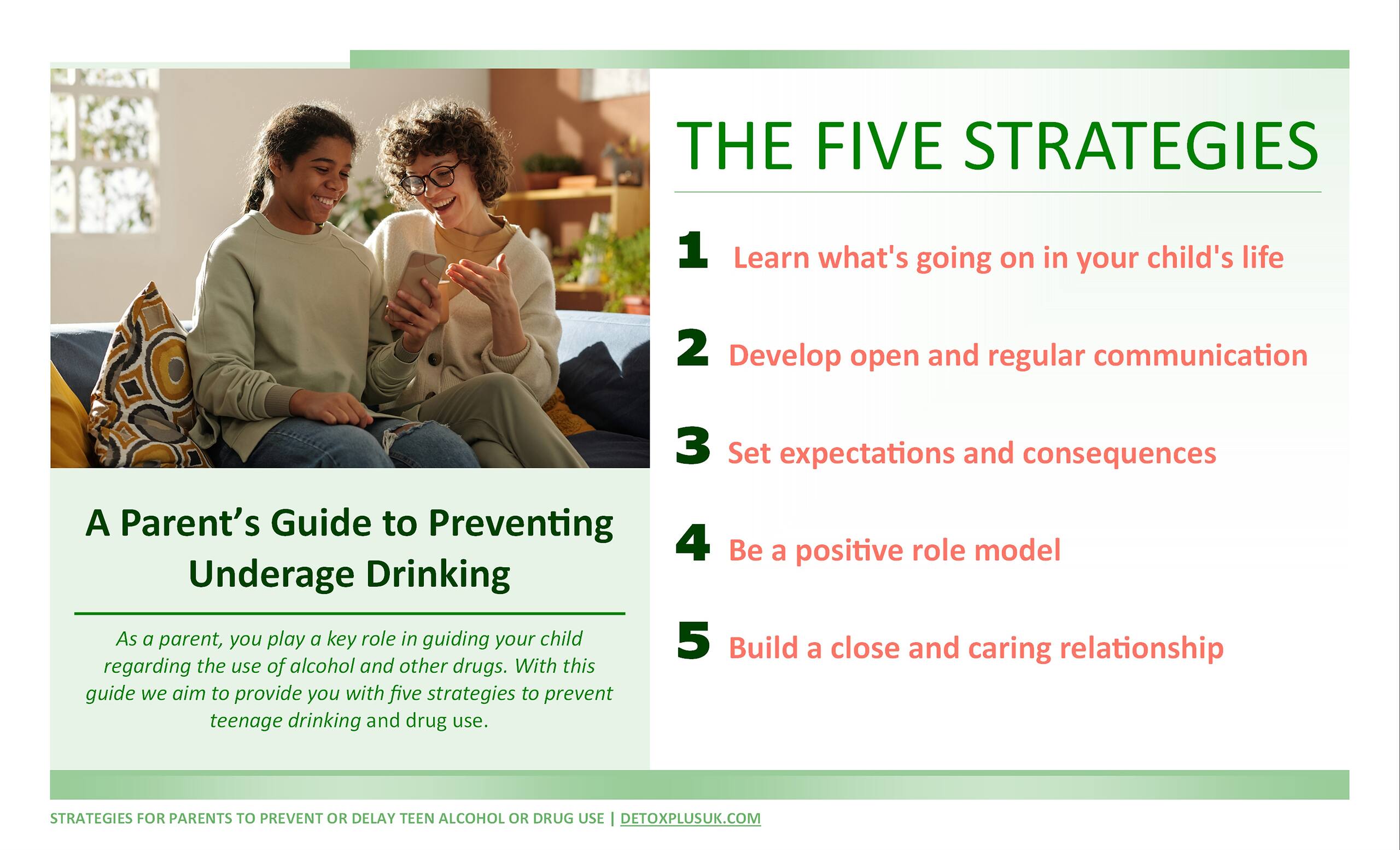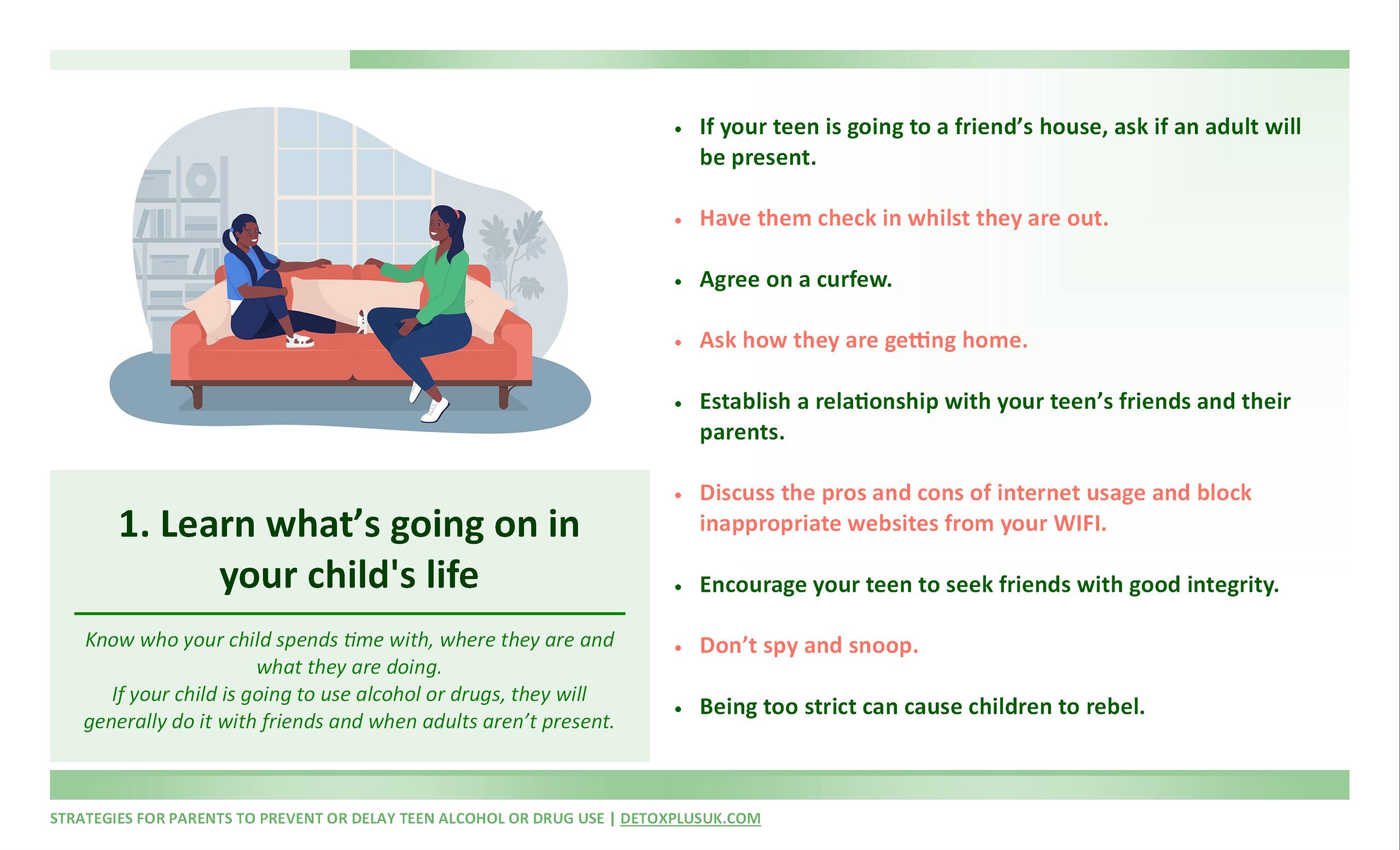The five strategies to preventing your child from drinking alcohol
As a parent, you play a key role in guiding your teenagers regarding alcohol and other drugs.
This guide aims to provide you with five strategies to prevent teenage drinking and drug use.
Download the full PDF: A parents guide to preventing underage drinking
Alcohol and drug use can negatively affect a teen’s development.
Table of contents
Learn what’s going on in your child’s life
Develop open and regular communication
Set expectations and consequences
Build a close and caring relationship

It’s against the law:
- for anyone to buy alcohol if they’re under 18 years old
- for under 18 year olds to ask anyone else to buy alcohol for them
- to give a child alcohol if they are under five years old.
It’s legal:
- for over 18s to buy beer, wine or cider for 16 and 17-year-olds if they’re having a meal together in licensed premises, like a pub
- for 5 to 17-year-olds to drink alcohol at home or other private premises.
Short-term risks
- Alcohol Poisoning
- Memory problems
- Accidents i.e. Car crashes, falls, burns, drownings
- Struggling with school Trouble with the law
- Difficulty dealing with emotions and problem-solving
Long-term risks
- Not achieving their full potential
- Dependence
- Social and family issues
- Mental illness Legal or money problems
1. Learn what is going on in your teen’s life
Know who your teenager spends time with, where they are and what they are doing. If your teenager uses alcohol or drugs, they will generally do it with friends and when adults aren’t present.
- If your teen goes to a friend’s house, ask if an adult will be present. •
- Have them check in while they are out.
- Agree on a curfew.
- Ask how they are getting home.
- Establish a relationship with your teen’s friends and their parents.
- Discuss the pros and cons of internet usage and block inappropriate websites from your WIFI.
- Encourage your teen to seek friends with good integrity.
- Don’t spy and snoop.
- Being too strict can cause teenagers to rebel.

2. Develop open and regular communication
Communication between a parent and teen allows both to explore areas of interest and worries. The way you communicate has a significant impact on preventing or delaying alcohol or drug use in teenagers.
- Attempt to make it a conversation, not an interrogation, with yes or no answers.
- Discuss your concerns about the risks of drug and alcohol use.
- Talk as early and often as you can.
- Ask your teen what they think about drugs and alcohol.
- Explore ways to manage peer pressure.
- Discuss how alcohol and drugs are glamorized in the media.
- Be clear about your expectations and rules around alcohol and drug use.
- Learn the facts before approaching the conversation.
- Think about your body language and tone of voice.

3. Set expectations and consequences together
Setting clear expectations helps create an environment where rules are respected. Establishing boundaries early on means there is no uncertainty about your rules.
- Set rules before your teen uses alcohol or drugs.
- Work together to create rules and consequences.
- Base these on the age and maturity of your teenager.
- Make sure you and your teen have a clear understanding of your expectations.
- Stay calm when following through with consequences.
- Be consistent and follow through with consequences immediately.

4. Be a positive role model
When teenagers have a positive role model, they will likely engage in constructive actions like those they admire. young adults notice more thank you think. Your teen will be heavily influenced by what you say and do.
- Show your teen that you have fun without substances.
- When people come over to your house, provide non-alcoholic options.
- Don’t get drunk or high when your teen is around.
- Let your family and close friends know about the values you are teaching your child, and ask them to model responsible behaviour.
- Remember how much and when a parent chooses alcohol or other drugs will affect your child’s decisions about their use.
- Children learn behaviours by observing adult role models, including teachers, coaches and older siblings.
- Show and talk about healthy ways to manage stress, such as going for a walk after a busy day or meeting friends.

5. Build a close and caring relationship
A close relationship can help delay when youths first try alcohol and drugs. A close bond encourages your child to discuss their problems and concerns with you. It also encourages conversations about making good choices.
- Support your teen to find their passions and interests.
- Be involved. Participate in activities that interest your child.
- Make time for your teen. Spend one-on-one time together when possible.
- Remind them that you love and care for them often.
- Notice when your child makes good choices and praise them for their efforts and achievements.
- Encourage them to discuss problems and concerns with you.
- Chat while you eat, walk and watch TV together.
- Remember to build your child’s confidence. Confident teens are more likely to make better choices in life.
- Respect your teen’s independence, but stay connected.

Communication between parent and teen
Having effective communication with your teenager or young adult doesn’t always have to feel like interrogating them. Stay calm, unwind, and implement the suggestions below to guarantee your child understands what you’re saying – and vice versa.
Try to be objective and open
Strive to be impartial and receptive. If you desire a constructive dialogue with your child, try to have an open mindset and listen to their perspective. Your child will be more willing to listen in this manner.
Ask open-ended questions
Pose questions that allow for a more profound response beyond a simple affirmation or negation, encouraging a more active and fruitful dialogue.
Ask what motivates them to drink alcohol
Inquire about the reasons behind your child’s desire to consume alcohol. This prompts your adolescent to contemplate their future, establish their limits regarding drinking, and consider potential adverse outcomes. These could involve arriving late to commitments, engaging in foolish or hazardous behaviour, or experiencing the effects of a hangover. Additionally, it allows you to understand the underlying factors influencing your child’s decision to drink. Consequently, you can propose strategies for effectively addressing those motivations.
Ensure they feel that they are being heard
Make sure your child understands that their thoughts and feelings are being acknowledged. Show them active listening by repeating what you have heard, either word for word or by capturing the general idea. For instance, you could say, “I understand that you feel stressed and believe that drinking helps you unwind. Am I correct?”
Discuss the harmful effects of alcohol
Engage in a conversation about the adverse consequences of alcohol, both in terms of mental and physical well-being, as well as safety and the ability to make wise choices. Discuss the potential long-lasting effects it can have.
Show empathy and kindness
Make sure your child feels understood. Adolescence can be challenging. Recognize that everyone faces difficulties occasionally, but using alcohol as a means to cope is neither beneficial nor healthy. Assure your child that they can confide in you.
Discuss any concerns over addiction in the family
If addiction runs in your family, your child is at a significantly higher risk of developing a problem. Stay mindful of this increased risk and have regular conversations with your child about it, treating it like any other illness.
Where to get help
Where to get mental health support as a youth To get help for your mental health, you’ll need to talk to someone who can put you in touch with your local children and young people’s mental health services. This is called ‘a referral’. You could speak to a teacher, GP, youth or social worker.


